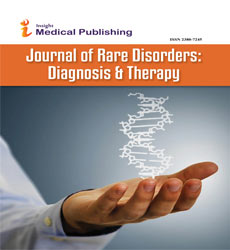Editorial on Depression
Sophia Roberts
DOI10.36648/2380-7245.7.1.214
Managing Editor, Journal of Rare Disorders: Diagnosis & Therapy, E-mail: raredisord@imedpubjournal.org
Editorial
Depression is the main cause of disability worldwide, according to the World Health Organization (WHO).
Depressive Disorder or Clinical Depression is a mood disorder that causes distressing symptoms that affect how you feel, think, and handle daily activities, such as sleeping, eating, or working.
There are many possible causes, and sometimes, various factors combine to trigger symptoms. Changes in the brain’s neurotransmitter levels, genetic features, environmental factors, psychological and social factors, additional conditions, such as bipolar disorder [1].
Types of Depression
Major Depression: In major depression symptoms of depression occurs most of the day, nearly every day for at least 2 weeks that interfere with your ability to work, sleep, study, eat, and enjoy life.
Persistent Depressive Disorder: Having symptoms of depression that last for at least 2 years.
Perinatal Depression: During pregnancy or after delivery, women with perinatal depression experience full-blown major depression.
Seasonal Affective Disorder (SAD): SAD is a type of depression that comes and goes with the seasons.
Psychotic Depression: This type of depression occurs when a person has severe depression plus some form of psychosis, such as delusions and hallucinations [2].
Causes
Researchers suggest that a combination of genetic, biological, environmental, and psychological factors play a role in depression.
In females
Depression is common among women as men, according to the Centers for Disease Control and Prevention (CDC).
Irritability, anxiety, mood swings, fatigue and ruminating (dwelling on negative thoughts).
In males
Approximately 9% of men in the United States have feelings of depression or anxiety, according to the American Psychological Association.
Males with depression are more likely than females to drink alcohol in excess, display anger, and engage in risk-taking as a result of the disorder [3].
Symptoms of Depression
Persistent sad, anxious, or “empty” mood, Feelings of hopelessness or pessimism, Feelings of guilt, worthlessness, or helplessness, Loss of interest or pleasure in hobbies or activities, Loss of energy or increased fatigue, Difficulty concentrating, remembering, or making decisions, Difficulty sleeping, early-morning awakening, or oversleeping, Appetite and/or weight changes, Thoughts of death or suicide or suicide attempts, Restlessness or irritability, Aches or pains, headaches, cramps, or digestive problems without a clear physical cause and/or that do not ease even with treatment, Feeling worthless or guilty, Difficulty thinking, concentrating or making decisions [4].
Risk Factors for Depression
Genetics: Depression can run in families.
Biochemistry: Differences in certain chemicals in the brain may contribute to symptoms of depression.
Environmental factors: Violence, neglect, abuse or poverty may make some people more vulnerable to depression.
Personality: People with low self-esteem, who are easily overwhelmed by stress, or who are generally pessimistic appear to be more likely to experience depression.
Treatment
The first step in getting the right treatment is to visit a health care provider or mental health professional, such as a psychiatrist or psychologist. Living with depression can be difficult, but treatment can help improve your quality of life. Medications, Psychotherapy, Light therapy, Alternative therapies, Exercise and Avoid alcohol and drugs, Learn how to say no and Take care of yourself [4].
References
Open Access Journals
- Aquaculture & Veterinary Science
- Chemistry & Chemical Sciences
- Clinical Sciences
- Engineering
- General Science
- Genetics & Molecular Biology
- Health Care & Nursing
- Immunology & Microbiology
- Materials Science
- Mathematics & Physics
- Medical Sciences
- Neurology & Psychiatry
- Oncology & Cancer Science
- Pharmaceutical Sciences
